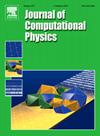复杂PDE系统的能量耗散演化Kolmogorov-Arnold网络
IF 3.8
2区 物理与天体物理
Q2 COMPUTER SCIENCE, INTERDISCIPLINARY APPLICATIONS
引用次数: 0
摘要
在这项工作中,我们引入了一个进化Kolmogorov-Arnold网络(EvoKAN),这是一个求解复杂偏微分方程(PDEs)的新框架。EvoKAN建立在Kolmogorov-Arnold网络(KANs)的基础上,其中激活函数是基于样条的,并且在每个边缘上都是可训练的,提供了跨多个尺度的局部灵活性。EvoKAN在初始学习阶段只对PDE的初始状态进行编码,而不是重复地重新训练网络。EvoKAN将Kolmogorov-Arnold网络权值建模为时间相关函数,并通过控制偏微分方程的演化对其进行更新。通过将EvoKAN权重作为相关坐标中的连续函数并随时间更新,EvoKAN可以在任意长的范围内预测系统轨迹,这对许多传统的基于神经网络的方法来说是一个显著的挑战。此外,EvoKAN采用标量辅助变量(SAV)方法,保证了无条件的能量稳定性和计算效率。在单个时间步长,SAV只需要求解解耦的常系数线性系统,实现大大简化。我们在一些复杂的偏微分方程中,包括一维和二维Allen-Cahn方程和二维Navier-Stokes方程,对所提出的框架进行了测试。数值结果表明,EvoKAN解与解析参考文献和已建立的数值基准非常吻合,在预测Allen-Cahn方程解和预测Navier-Stokes方程解时有效地捕获了尖锐界面和湍流流型。本文章由计算机程序翻译,如有差异,请以英文原文为准。
Energy-dissipative evolutionary Kolmogorov-Arnold networks for complex PDE systems
In this work, we introduce an evolutionary Kolmogorov-Arnold Network (EvoKAN), a novel framework for solving complex partial differential equations (PDEs). EvoKAN builds on Kolmogorov-Arnold Networks (KANs), where activation functions are spline-based and trainable on each edge, offering localized flexibility across multiple scales. Rather than retraining the network repeatedly, EvoKAN encodes only the initial state of the PDE during an initial learning phase. EvoKAN models Kolmogorov-Arnold network weights as time-dependent functions and updates them through the evolution of the governing PDEs. By treating EvoKAN weights as continuous functions in the relevant coordinates and updating them over time, EvoKAN can predict system trajectories over arbitrarily long horizons, a notable challenge for many conventional neural network-based methods. In addition, EvoKAN employs the scalar auxiliary variable (SAV) method to guarantee unconditional energy stability and computational efficiency. At individual time step, SAV only needs to solve the decoupled linear systems with constant coefficients, the implementation is significantly simplified. We test the proposed framework in several complex PDEs, including one-dimensional and two-dimensional Allen–Cahn equations and two-dimensional Navier-Stokes equations. The numerical results show that the EvoKAN solutions closely match the analytical references and established numerical benchmarks, effectively capturing the sharp interfaces in predicting the solution of the Allen-Cahn equation and turbulent flow patterns in predicting the solution of the Navier-Stokes equations.
求助全文
通过发布文献求助,成功后即可免费获取论文全文。
去求助
来源期刊

Journal of Computational Physics
物理-计算机:跨学科应用
CiteScore
7.60
自引率
14.60%
发文量
763
审稿时长
5.8 months
期刊介绍:
Journal of Computational Physics thoroughly treats the computational aspects of physical problems, presenting techniques for the numerical solution of mathematical equations arising in all areas of physics. The journal seeks to emphasize methods that cross disciplinary boundaries.
The Journal of Computational Physics also publishes short notes of 4 pages or less (including figures, tables, and references but excluding title pages). Letters to the Editor commenting on articles already published in this Journal will also be considered. Neither notes nor letters should have an abstract.
 求助内容:
求助内容: 应助结果提醒方式:
应助结果提醒方式:


